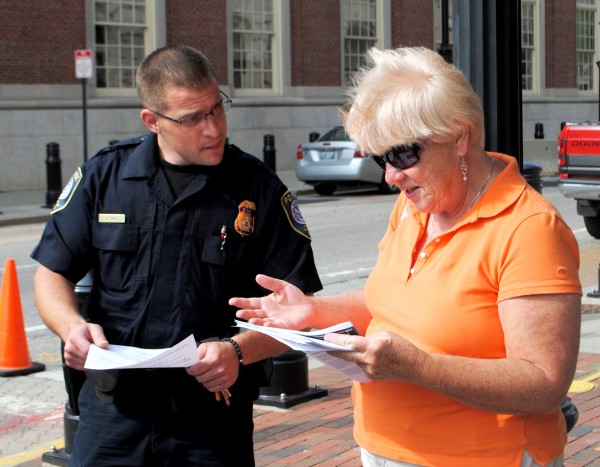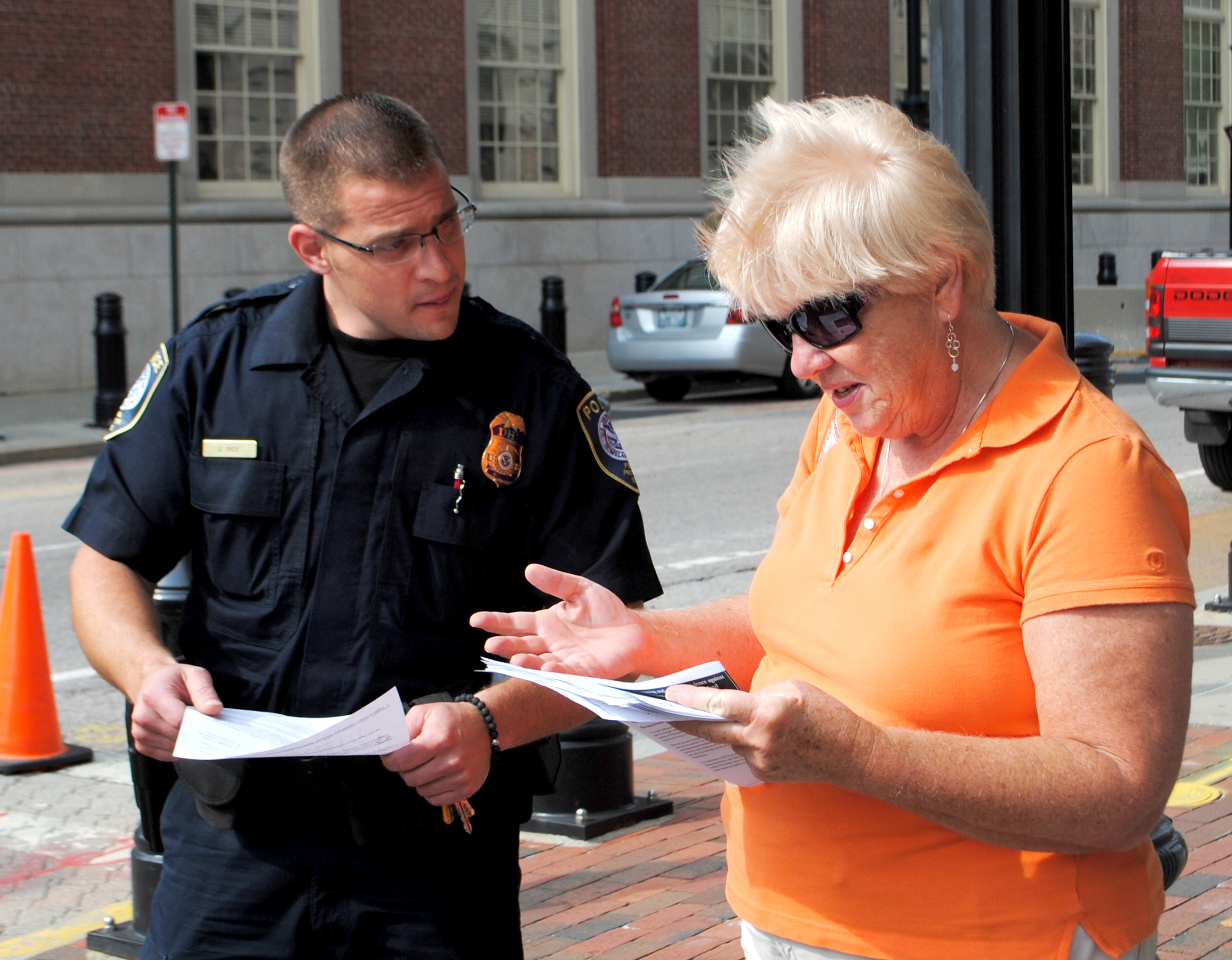 The House Judiciary Committee heard testimony on the Comprehensive Community Police Relations Act, (CCPRA) H5819, a bill that seeks to combat racial profiling by requiring “all police departments to submit to the Office of Highway Safety an annual report indicating what action has been taken to address any racial disparities in traffic stops and/or searches.”
The House Judiciary Committee heard testimony on the Comprehensive Community Police Relations Act, (CCPRA) H5819, a bill that seeks to combat racial profiling by requiring “all police departments to submit to the Office of Highway Safety an annual report indicating what action has been taken to address any racial disparities in traffic stops and/or searches.”
The act would also prohibit police officers from asking juveniles and adult pedestrians if they will consent to be searched. Right now, a police officer who lacks probable cause to conduct a search is allowed to ask permission to search pockets and backpacks. Preventing police officers from asking for permission to conduct searches of citizens who present no probable cause protects juveniles from being intimidated into giving assent.
The bill under consideration is the culmination of at least 12 years of effort on behalf of community organizations and members of law enforcement. Providence Public Safety Commissioner Steven Paré helped craft the bill in a way that would satisfy a wide range of concerns. The meetings were held in an open and forthright manner and anyone was welcome to join in.
Why then does Attorney General Peter Kilmartin‘s office oppose the bill?
Special Assistant Attorney General Joee Lindbeck testified that the AG’s office opposes the bill because it would require police officers to ask permission to search juveniles. She also said that the Attorney General’s office was not privy to the meetings between law enforcement and community group’s where the bill was put together.
Under questioning from Representative Edie Ajello, Lindbeck admitted that under current law, a police officer without probable cause cannot ask for consent to search your automobile, but is allowed to ask for consent to search an adult pedestrian or juvenile. Doesn’t this, asked Ajello, protect the privacy of automobile drivers more than the privacy of adult pedestrians and juveniles?
“That is a position you could take, I believe,” replied Lindbeck.
Michael Évora, director of the Rhode Island Commission for Human Rights, took issue with the Attorney General’s position on the bill. The bill does not prohibit a police officer from searching an adult pedestrian or juvenile if there is probable cause. It only prevents a police officer from asking for permission if there is not probable cause. This does not amount to a public safety issue, as Lindbeck asserted, said Évora.
Évora also took issue with the idea that the Attorney General’s office was somehow unaware of or not able to attend the meetings between community organizations and law enforcement officials where the bill was painstakingly crafted. “The meetings were always open,” said Évora. Further, Évora maintains that Commissioner Paré and Attorney General Kilmartin met weekly on a variety of issues, and that Kilmartin was surely informed about the content of the bill. “It is disingenuous at best,” said Évora, “to say the Attorney General was not aware.”
Speaker after speaker addressed the necessity and immediacy of the CCPRA.
Jim Vincent of the RI NAACP spoke of the importance of this legislation in building some sense of trust between communities of color and the police. “There is no need for a Rhode Island name,” said Vincent, “to be added to the long list of young men and women who have needlessly lost their lives due to police violence.”
“If we have hopefully learned anything from the outbreaks in Ferguson, Cleveland, Staten Island and of course the recent unrest in Baltimore,” said Jordan Seaberry, chairman of the Univocal Legislative Minority Advisory Commission, “it is that we cannot afford to avoid the question of race in our society.”
Seaberry went on to say that the legislators in the General Assembly “are tasked with creating the conditions for Rhode Islanders to prosper.”
“As long as racial profiling exists, we in fact are dooming families, neighborhoods [and] communities to [the] fringes. We cannot have prosperity without equity.”
Ray Watson, director of the Mt. Hope Community Center was offended that the Attorney General’s office would suggest that the process of developing the bill was not open and inclusive. He was doubly offended that the rights of juveniles were held to a lower standard than the rights of automobile owners.
Prompted by Rep. Edie Ajello, Watson spoke about being stopped and searched by the police, and the effect police harrassment has on young people of color. “It gets to a point that when you’re a youth and you’re out in the community, I mean, there’s only so much your parents can do to protect you. So you get to a point where you’re like, ‘you know what, as long as I didn’t get arrested or I didn’t hurt it’s fine’ but it definitely breeds resentment towards law enforcement.”
In compelling testimony, Ann DeCosta spoke of her concern for her 23 year old son, a recent graduate of the University of Rhode Island. The problems of raising a child are multiplied when raising a young man of color in this society, says DeCosta, “From a young age I taught my child, if you get separated from me, if you are hurt, if you need assistance, look for that badge… that’s the person you need to trust.”
But, when her son got older, and went to URI, her son told her that, “he gets stopped, 3 or 4 times a month in North Kingstown and Narragansett… I find this very upsetting… Everyone in the car is asked for ID, sometimes they’re pulled out of the car and searched for reasons such as having an air freshener hanging from the mirror…”
When Eugene Montero sent his son to the store for some milk in Coventry, his son was stopped by a police officer and told to turn out his pockets because he “fit the description” of someone selling drugs. When Montero called the police station to complain about his son’s treatment, the police had no record of the incident. “What I’m sad to say,” said Montero, “is that my kids have had several incidents since moving back to Rhode Island. My two boys who are now grown, have moved. They live in Florida.”
When Mike Araujo was 14 years old, he was beaten “very badly” by a police officer. “I had my skull split. I had my eye orbit broken. I had my jaw broken. My fingers broken. He broke my ankle. I remember that he stepped on my knees to prevent me from standing up.”
When Araujo became an adult, he tried to look into the beating he had endured. “When I looked into the record, I found it was really hard to find my own name. I finally found it, it was ‘African American male, approximately 18,’ (I was 14), ‘resisted arrest on Westminster St.'”
As these stories show, presently there is little to know accountability. Without the police keeping accurate records of all stops and searches, there is no way to introduce policies to curb abuses and racism. The Comprehensive Community Police Relations Act would be a great start in the right direction.




